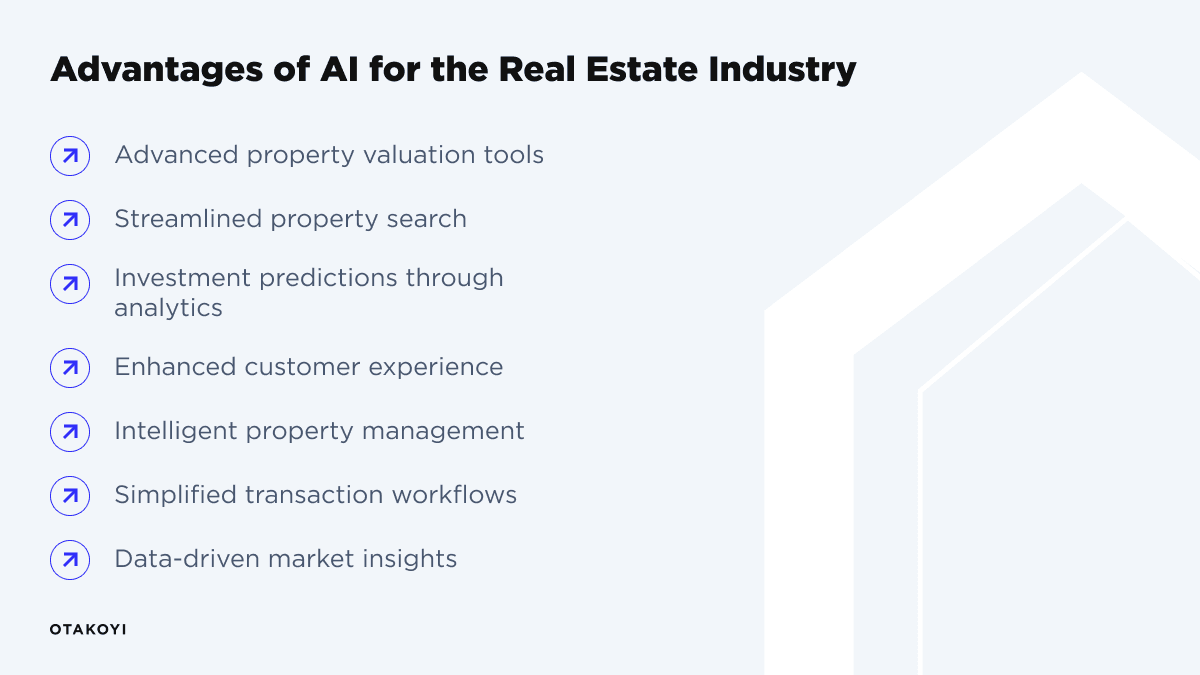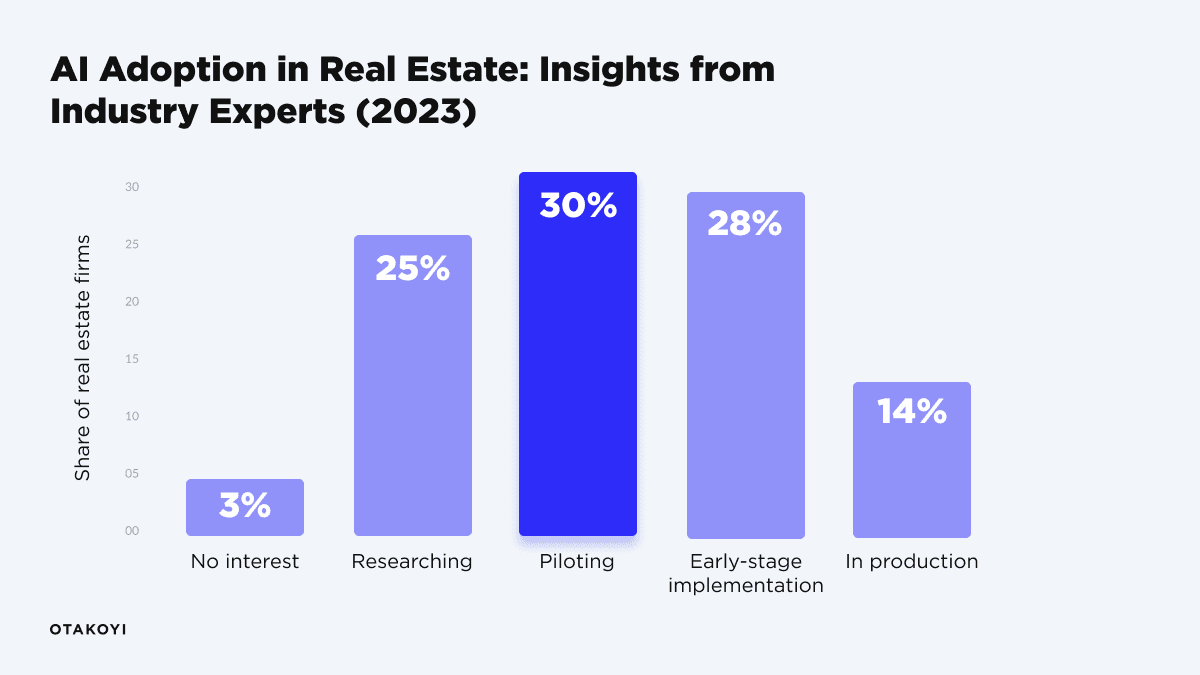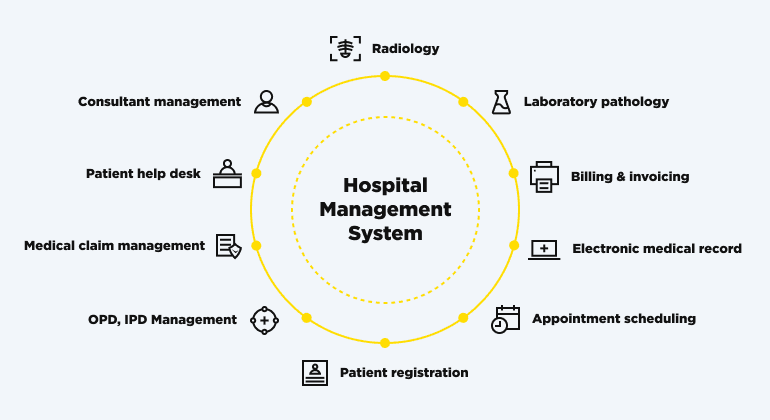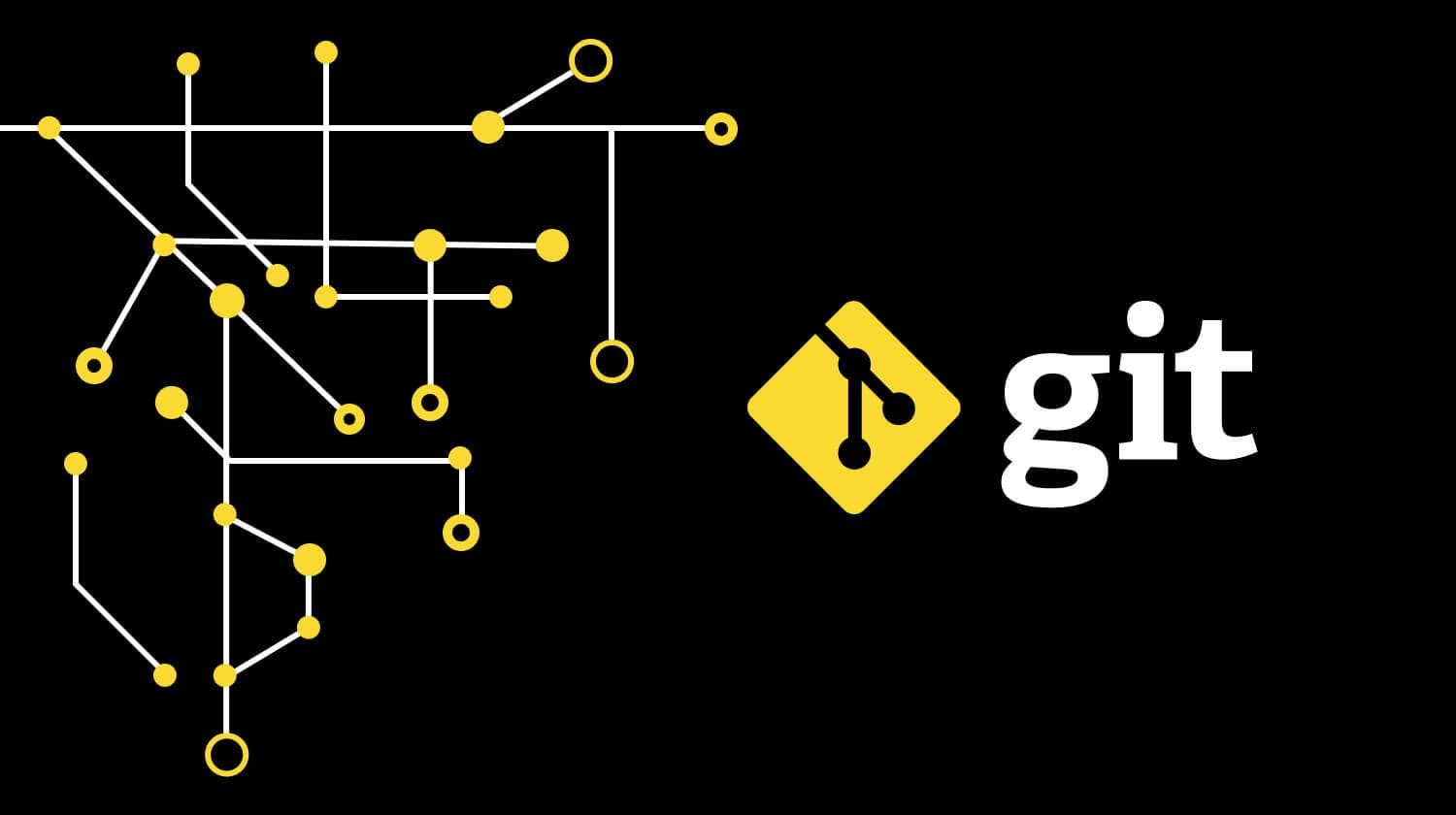Artificial Intelligence (AI) has emerged as a driving force in numerous industries, and real estate is no exception. From streamlining property searches to offering accurate valuations and even predicting market trends, AI’s influence is growing rapidly. Businesses that embrace and utilize such advancements are positioning themselves ahead of the curve, benefiting from tools that make their operations more efficient, data-driven, and customer-focused.
AI and ML development services may seem like a complex and distant technology from a Sci-Fi movie, yet it’s being used by real estate agents, brokers, investors, and property managers to improve customer experiences, enhance decision-making, and optimize property management tasks. You should also be amazed by the fact that AI in the real estate market is expected to grow from $164.96 billion in 2023 to $226.71 billion in 2024 at a CAGR of 37.4%. So, let’s take a deep dive and unveil how AI is being applied in the real estate marketplace and the key benefits it offers.

Understanding Artificial Intelligence (AI) in Real Estate
Applying AI in the real estate sector holds revolutionizing potential for the industry, affecting both professionals and customers.
Overall speaking, gene AI in real estate is a real game changer as it:
Optimizes property search results
Traditional property searches offer you no more than a manual time-consuming filtering based on location, price, and other factors. AI takes this to the next level by analyzing user behavior and preferences and recommending properties that meet stated criteria and implicit preferences.
Predicts market trends and values
AI-driven predictive analytics can assess past and current data to forecast future trends. Therefore, Artificial Intelligence platforms generate insights that were previously difficult to obtain, whether it’s predicting shifts in property prices or emerging neighborhoods.
Automates property valuation processes
AI in real estate can assess large datasets in minutes — including property features, market trends, and historical data — to provide real-time property valuations. Such tools minimize human error and speed up the entire process.
Streamlines property management tasks and routine tasks
Managing multiple properties is an overwhelming endeavor without proper optimization and streamlining tools. AI automates routine tasks such as rent collection, tenant communication, and maintenance scheduling, freeing up property managers to focus on more strategic activities. Beyond automation, businesses are adopting advanced AI tools for property management that unify these functions into a single intelligent system, making day-to-day operations more efficient and less error-prone.
Enhances customer service with automation
AI-powered chatbots and virtual assistants are reshaping customer service in the real estate sector. Bots can handle inquiries, provide property detail information, schedule appointments, and even offer personalized suitable property suggestions – all without the need for human intervention.
Supports virtual experiences in real estate
Virtual reality and AI in real estate work hand in hand to offer immersive property tours - the must-have innovation in the industry. Exploring properties remotely gives potential buyers a realistic sense of the space without having to be physically present. AI also customizes the tour based on user preferences, showing relevant features, suggesting similar properties, or building design to fit the client’s vision.
Increases security by detecting fraud
Fraud detection systems powered by AI can identify and alert users of unusual patterns in financial transactions, tenant behavior, or lease agreements. These systems power businesses up with an additional layer of security, minimizing the risk of fraud in real estate deals.
Helps make more informed decisions regarding real estate investments
AI tools provide real estate investors with data-driven insights into market trends, property values, and potential risks. With access to predictive analytics, investors can make more information-driven decisions, minimizing risk factor and maximizing returns.
Increases security by detecting fraud
Fraud detection systems powered by AI can identify and alert users of unusual patterns in financial transactions, tenant behavior, or lease agreements. These systems equip businesses with an additional layer of security, minimizing fraud risks.
Integrates with smart home systems
AI in real estate plays an enormous role in smart home technology! AI-driven smart home systems are becoming a major selling point for modern properties, from controlling lighting and temperature to enhancing security features.
Assists in urban planning decisions and projects
Finally, Artificial Intelligence delivered a solution to creating more sustainable and efficient urban development plans. Urban planners can now leverage AI to analyze large datasets assessing population growth, traffic patterns, environmental factors, and more.
Advantages of AI for the Real Estate Industry
AI’s capabilities extend far beyond the basic automation of tasks. By implementing AI solutions, real estate professionals can tap into powerful tools that optimize their daily operational efficiencies and unlock new growth opportunities. Let’s dig in and explore the key advantages of using AI in real estate.

Advanced property valuation tools
One of the most significant challenges in real estate is ensuring that property valuations are accurate, timely, and data-driven. AI-powered valuation tools analyze various data sources – including historical sales data, current market conditions, property features, and even external factors like economic trends. The result? More precise property valuations in a fraction of the time it would take a human examiner.
Additionally, such tools empower realtors to provide their clients with instant, reliable property valuations. Whether you’re working with buyers, sellers, or investors, this kind of accuracy builds trust and boosts the decision-making process.
Streamlined property search
Gone are the days when prospective buyers had to sift through hundreds of listings manually. AI has revolutionized property search platforms by learning user preferences and offering personalized recommendations. Using machine learning algorithms, AI can interpret what buyers truly desire — even when they aren’t sure how to articulate it.
Whether it’s budget, location, or specific features like a large backyard or open floor plan, AI in real estate fine-tunes property search results to show the most relevant listings. This enhances the overall user experience, saves time, and leads to quicker transactions.
Investment predictions through analytics
Investors in the real estate sector can significantly profit from AI-driven predictive analytics. How does it work? AI-driven tools analyze historical data, evaluate investment risks, assess market trends, and study economic indicators to guide investors to more educated and strategic decisions.
For instance, AI can identify emerging “IT” neighborhoods before they become hotspots, giving investors a competitive advantage. Similarly, it can generate valuable insights into when to buy, hold, or sell properties based on projected market trends, saving investors money, time, and nerves.
Enhanced customer experience
Let’s be honest, we live in the digital-first world, where customers expect instant responses and human interactions. AI-powered chatbots and virtual assistants provide this kind of support, offering 24/7 assistance and guiding customers through every step of the buying or renting journey.
These tools reduce the workload for realtors while ensuring that customers get the support they need when they need it, by handling inquiries, scheduling property viewings, and offering personalized recommendations. This drastically improves customer satisfaction and enhances brand loyalty, increasing customer fidelity and endorsement rates.
Intelligent property management
Property management involves a wide range of tasks, from predictive maintenance requests to tenant communications. Generative AI in real estate can automate the majority of these operations, improving efficiency and personalization, and freeing up time for property managers to focus on more strategic assignments.
As an example, AI systems will automatically schedule maintenance appointments, send rent reminders, and even resolve common tenant issues via chatbots. This leads to smoother operations, fewer errors, and a better overall experience for both tenants and property managers.
Simplified transaction workflows
In traditional real estate transactions loads of paperwork and delays are almost inevitable due to the complexity of legal documents. AI tools can streamline this process by automating document generation, reviewing contracts, and even identifying potential issues before professionals face them.
Automating these tasks eliminates human error, speeds up transactions, and ensures that everything complies with legal requirements. Such workflow makes life easier for real estate agents and guarantees peace of mind for buyers and sellers.
Data-driven market insights
Real estate professionals rely heavily on data to make informed decisions. AI in real estate goes a step further by analyzing vast amounts of data from various sources—such as market trends, consumer behavior, and economic indicators—to generate actionable insights. This level of analysis allows realtors and investors to stay ahead of the competition, adjust their strategies in real time, and make educated data-powered decisions.
Whether you’re looking to invest in a new property, sell an existing one, or simply keep up with market trends, AI-powered insights give you the data-driven edge you need.
How AI is Transforming the Real Estate Sector
AI in real estate is no longer just a futuristic concept; it’s a key part of the real estate landscape. From improving customer service to driving smarter investment decisions, AI is shaping the future of the industry. The time to adopt AI is now, and real estate businesses that embrace this technology will be well-positioned for success in the years to come.
AI-powered property searches and suggestions
When potential buyers or renters search for properties, they always have specific criteria in mind—number of bedrooms, proximity to schools, charismatic features, or price range. AI-powered search platforms go beyond basic filters to understand user preferences and suggest properties that match their needs. Leveraging machine learning to analyze past behavior, search history, and even browsing habits, those platforms provide personalized suggestions.
Forecasting investment opportunities & market trends
In a dynamic real estate industry where everything can change overnight, staying ahead of market trends is a survival tactic. To stay in the lead real estate professionals have to play ahead, jump on the emerging trends, or even create new innovative solutions. AI makes all those tasks real by delivering insights into market conditions, predicting market movements, and helping investors and industry professionals make data-driven decisions and assess risks. AI roots its forecast in a range of data points, including economic indicators, property sales trends, and even social factors.
Virtual assistants & AI chatbots
Successful real estate business isn’t possible without flawless customer service, yet delivering 100% satisfactory results can be resource-intensive. AI-powered virtual assistants and chatbots are a game-changer, providing non-stop support to potential buyers, sellers, and tenants.
The AI-driven system can answer common or complicated questions, provide property information, schedule viewings and appointments, guide users through the mortgage process, and assist with the paperwork. With such a power tool, the real estate business can rapidly grow and deliver impeccable service.

Book your appointment today!
Contact usImmersive virtual property tours
Property hunting is an exhausting process for buyers and renters who don’t always have the time to visit properties in person to know if they deserve follow-up actions.
VR tours provide a realistic, immersive personalized experience, allowing potential buyers to walk through properties and view them from different angles.
Such innovation saves precious time for buyers and realtors, enabling both parties to escape needless logistics nightmares, settle on the best options, and close the deal much faster. VR tours are an especially powerful tool for agencies working with long-distance clientele.
Automated lease and document management
As usual, AI in real estate comes to the rescue to help professionals with time-consuming and complex tasks. AI-powered tools simplify lease management by automating many tasks, such as drafting lease agreements, reviewing terms, and ensuring regulatory compliance with local standards.
Additionally, automated document management systems identify potential issues in contracts, flagging them for review. Reduced the risk of errors and speeded up the entire leasing process benefits all parties involved - landlords, tenants, and realtors.
AI-based property valuation
Whether you’re pricing a property for sale or making an offer, knowing the market-appropriate valuation is crucial to close a deal. AI-based tools enable both professionals and common folk to make a data-driven property valuation by analyzing a cast cluster of data, from recent sales in the area and market conditions to striking features and the state of the property.
Smart property maintenance and oversight
AI-powered smart property maintenance is a secret to staying on top of crucial operations and predicting possible issues and setbacks. AI tools can forecast maintenance needs by analyzing data from property history, weather patterns, and tenant behavior.
Real estate investment portfolio optimization
How can investors minimize the challenges of managing multiple properties and enhancing their portfolios for maximum returns? The answer lies in AI-driven tools that assess and evaluate market trends, property performance, and investment risks to offer data-driven strategies.
Whether you’re looking to diversify your portfolio, invest in a new market, or sell underperforming properties, AI can provide real-time insights to guide you toward more educated investment decisions.
AI-driven lead generation
If there is no flow of new clients, how could the business thrive, right? Powering up your business with AI tools can significantly increase efficiency and close more deals through automatic lead generation.
AI tools can automatically identify and qualify leads by analyzing online behavior, search patterns, and other data points. Therefore, real estate professionals can focus their efforts on high-quality leads that are more likely to convert into sales.
Automated listing descriptions
Elevating web content and improving listing description is ensuring your business gets a wider audience with the increased outreach. AI makes time-consuming writing easier and more effective by generating property descriptions based on key features, location, and other data points.
Fraud detection and compliance monitoring
Opting for AI-powered fraud detection systems that analyze patterns in financial transactions, tenant behavior, and lease agreements to point out potential red flags adds an extra layer of security.
Comprehensive property analytics
AI offers real estate professionals an innovative way to analyze and interpret that data to determine how to market a property effectively, make better-informed decisions, settle on pricing a strategy, and decide when is better to sell for a better return.
AI for construction and project planning
AI is not just changing how properties are bought and sold – it’s also transforming how they’re built. AI tools guide construction teams to work more efficiently, avoid costly mistakes, and streamline crucial operations like project planning, timeline agreements, and resource allocation.
Intelligent property management systems
Why do it the old way when you can have a smooth and efficient property management process that takes only a fraction of your time? AI-powered property management systems streamline all the routine tasks like rent collection, tenant communication, maintenance requests management, lease renewals, and more.
Predictive AI for urban planning
Urban planners have to consider vast factors to develop sustainable and efficient neighborhoods and cities. AI tools can take a lot of pressure off by offering predictive analytics to generate insights on population growth, traffic patterns, crime rates, environmental factors, and social events.
24/7 Support with AI-powered chatbots & virtual assistants
Modern society expects businesses to provide around-the-clock support. AI-powered chatbots and virtual assistants are stepping in to meet this need. The always-on service is game-changing for buyers, sellers, and tenants who can get any of their questions and needs met in only a few clicks.
AI-powered chatbots help real estate professionals stay connected with their clients, even when they’re not available in person.
AI integration in smart homes
Smart homes are on an increasing trend to become the new staple of the real estate sector. AI is playing a key role in their real estate development, from controlling lighting and temperature to managing security systems.
Properties equipped with AI-driven smart home systems are more attractive to buyers, especially those who are looking for modern, energy-efficient homes.
The Role of AI in Shaping the Future of Real Estate
As AI technology continues to evolve, its impact on the real estate industry will only grow. Undeniably, AI tools and systems are a powerhouse that automates complex tasks, enhances customer experience and service, and reshapes the industry from the inside. As for now, we are already witnessing a trend in how AI dictates how properties are marketed and sold. Most importantly AI influences the process of property development and maintenance.
What forecast can we make seeing the impact AI tools provide in the current climate? AI systems are here to stay! The real estate businesses should make it their number one priority to explore and exploit innovative real estate solutions.

Expert Opinions
Real Estate Data Scientist:
AI is revolutionizing real estate by enhancing market efficiency. There are many automated valuation models and predictive analytics that allow for more accurate property evaluations and quicker transaction processes.
Technology Researcher:
You should consider that AI comes with some challenges. Data privacy concerns and algorithmic biases must be carefully managed to ensure both ethical and equitable outcomes.
Real Estate Investment Analyst:
From my perspective, AI provides investors with sophisticated tools to analyze market trends and predict future performance. Usually, it leads to more informed and strategic investment decisions.
Customer Experience Specialist:
AI is amazing! These new AI-driven chatbots and virtual assistants are transforming customer service in real estate. They offer 24/7 support and personalized interactions that significantly enhance the user experience. And simplifies work for us!
AI Developer:
There is no denying that the future of real estate is intertwined with AI. As technology advances, we can expect AI to drive further innovation. All real estate directions, from property management to market predictions, can be expected to be solved by AI-powered solutions.
Create Tailored AI Solutions for Real Estate with OTAKOYI
Working with the right AI partner can make all the difference when it comes to implementing AI solutions in your real estate company.
OTAKOYI offers a range of AI-driven services designed to meet the specific needs of the real estate sector. Whether you’re looking to improve customer service, streamline real estate management, or gain deeper insights into market trends, OTAKOYI can help you leverage AI to achieve your business goals.
When you work with OTAKOYI, you can expect
#1 Customized AI solutions
AI tailored to your unique business needs.
#2 Advanced data analytics
Gain deeper insights from AI-driven data analysis.
#3 Predictive insights
Forecast market trends and make strategic decisions with AI.
#4 Improved customer experience
Enhance customer service with AI-powered tools.
#5 Expert support and guidance
Access ongoing support from real estate developers and industry professionals.
#6 Profound industry expertise
Benefit from years of experience in AI and real estate.





